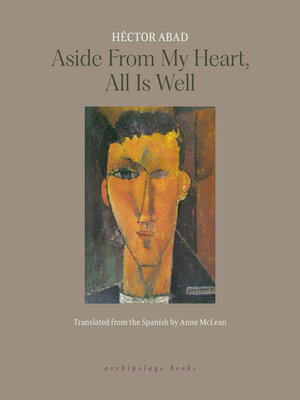
Sign up to save your library
With an OverDrive account, you can save your favorite libraries for at-a-glance information about availability. Find out more about OverDrive accounts.
Find this title in Libby, the library reading app by OverDrive.



Search for a digital library with this title
Title found at these libraries:
| Library Name | Distance |
|---|---|
| Loading... |
His biggest book since Oblivion, Héctor Abad’s humane voice buoys the spirit and reminds us of the value of human connection and the power of art.
"Mr. Abad’s prose is elastic and alive . . . [His writing] is extravagantly big-hearted."— Dwight Garner on Oblivion, The New York Times
Luis Cordóba, also known as Gordo, leads an unconventional life. His vocation as a priest has not stopped him from becoming a film critic, teacher, opera enthusiast, and passionate nibbler of chocolate and pepperoni. He lives in his childhood home in downtown Medellín with another priest, Aurelio Sánchez, or Lelo, among a slew of pets (war-mongering fish, a toucan, and parakeets aren't the half of it). It is Lelo who shades in these details, writing across time to the day in 1996 when life changed. At fifty, Gordo learns he needs a heart transplant. He is forbidden from climbing stairs, and so he moves into a different neighborhood with a friend, her housekeeper, and their children. With the briskness of sunshine drying out wet clothes, and air rushing through and renewing old places, Lelo reflects on Gordo's new era of thinking and feeling.
Luis Cordóba is inspired by the life of the priest and film critic Luis Alberto Alvarez, a friend of Héctor Abad's, and an important figure in Colombian cultural spheres. To keep Aside from My Heart, All is Well from becoming a biography, Abad drew on a range of sources to conjure up Cordóba, a person who both is and is not Alberto Alvarez.
"Mr. Abad’s prose is elastic and alive . . . [His writing] is extravagantly big-hearted."— Dwight Garner on Oblivion, The New York Times
Luis Cordóba, also known as Gordo, leads an unconventional life. His vocation as a priest has not stopped him from becoming a film critic, teacher, opera enthusiast, and passionate nibbler of chocolate and pepperoni. He lives in his childhood home in downtown Medellín with another priest, Aurelio Sánchez, or Lelo, among a slew of pets (war-mongering fish, a toucan, and parakeets aren't the half of it). It is Lelo who shades in these details, writing across time to the day in 1996 when life changed. At fifty, Gordo learns he needs a heart transplant. He is forbidden from climbing stairs, and so he moves into a different neighborhood with a friend, her housekeeper, and their children. With the briskness of sunshine drying out wet clothes, and air rushing through and renewing old places, Lelo reflects on Gordo's new era of thinking and feeling.
Luis Cordóba is inspired by the life of the priest and film critic Luis Alberto Alvarez, a friend of Héctor Abad's, and an important figure in Colombian cultural spheres. To keep Aside from My Heart, All is Well from becoming a biography, Abad drew on a range of sources to conjure up Cordóba, a person who both is and is not Alberto Alvarez.







